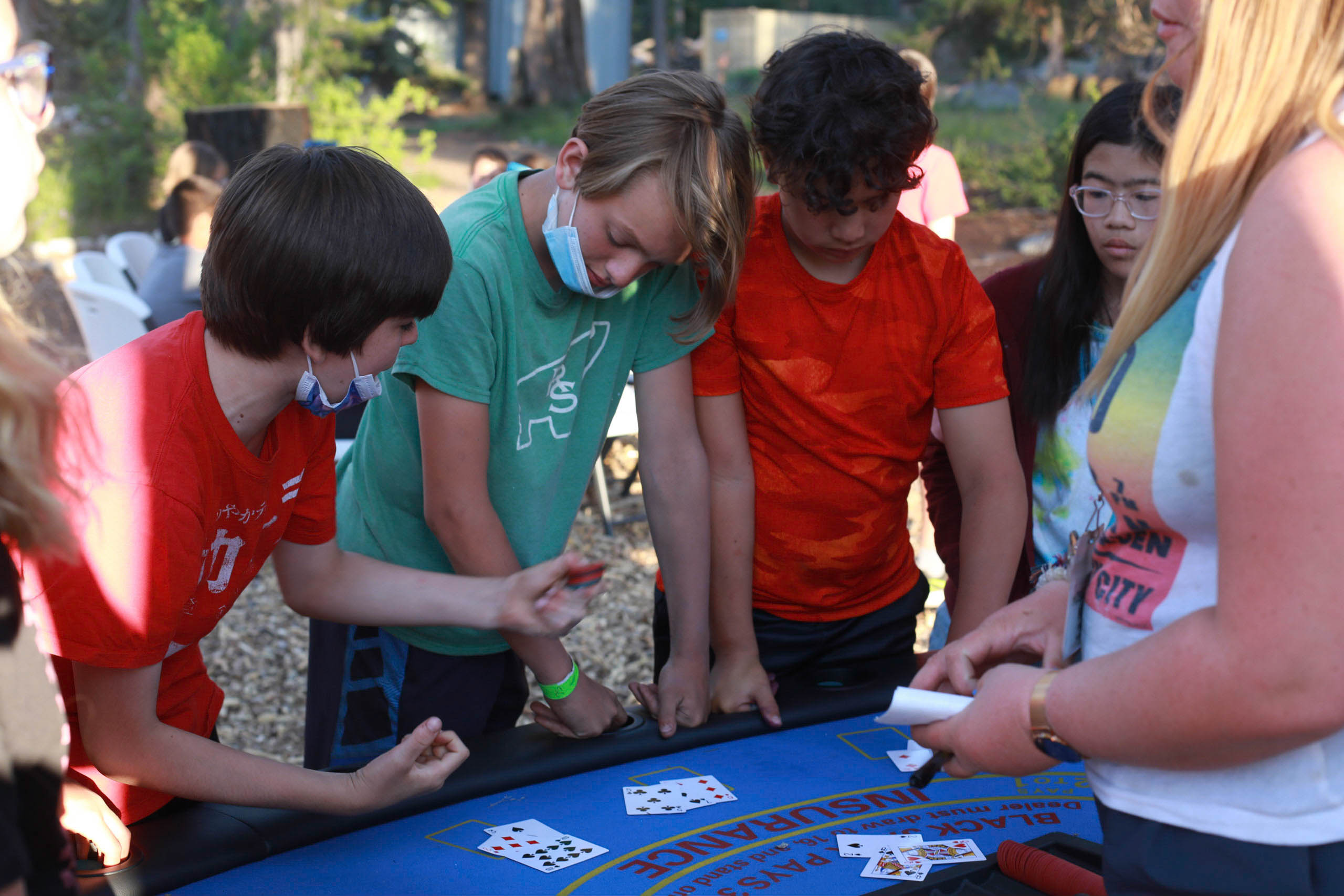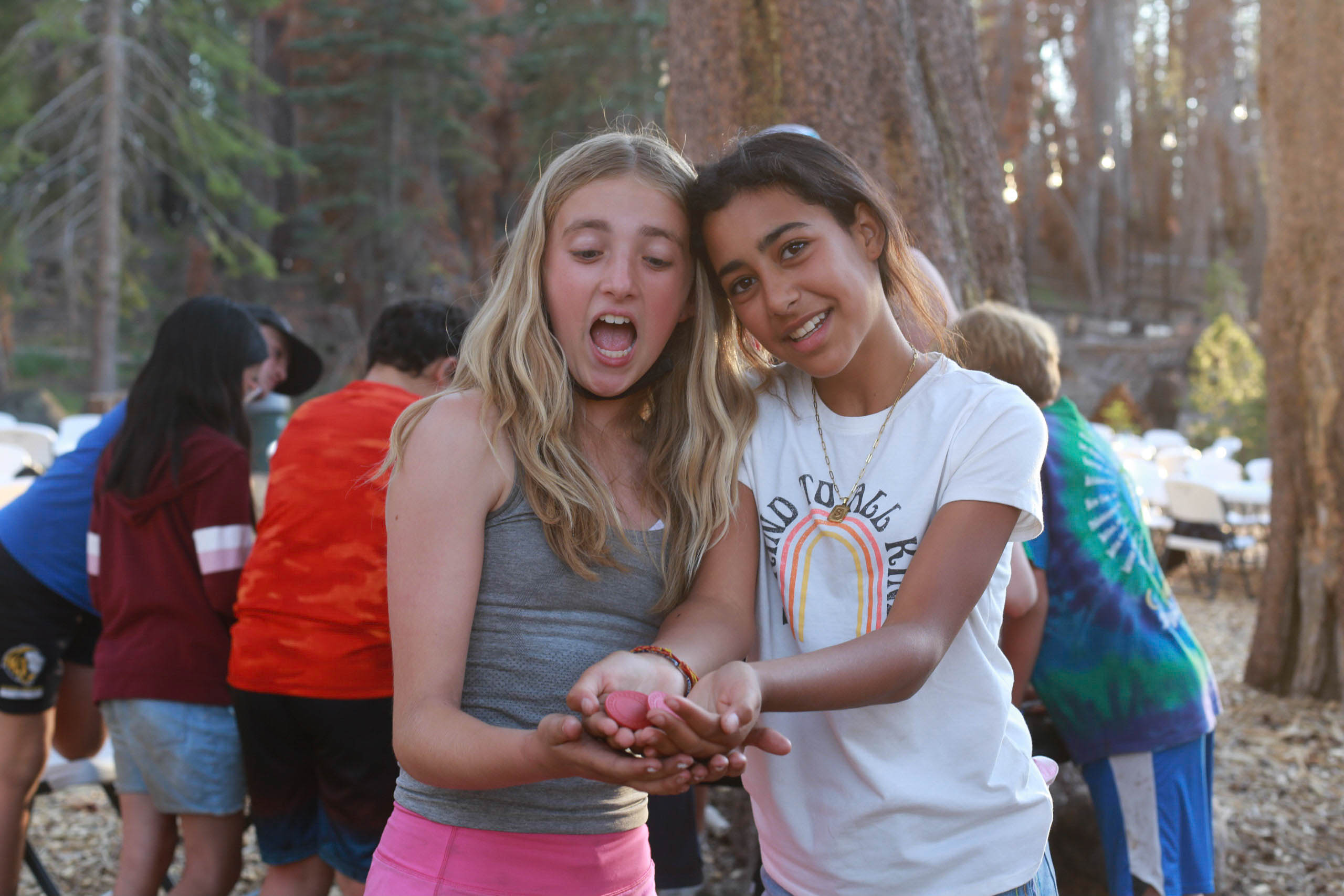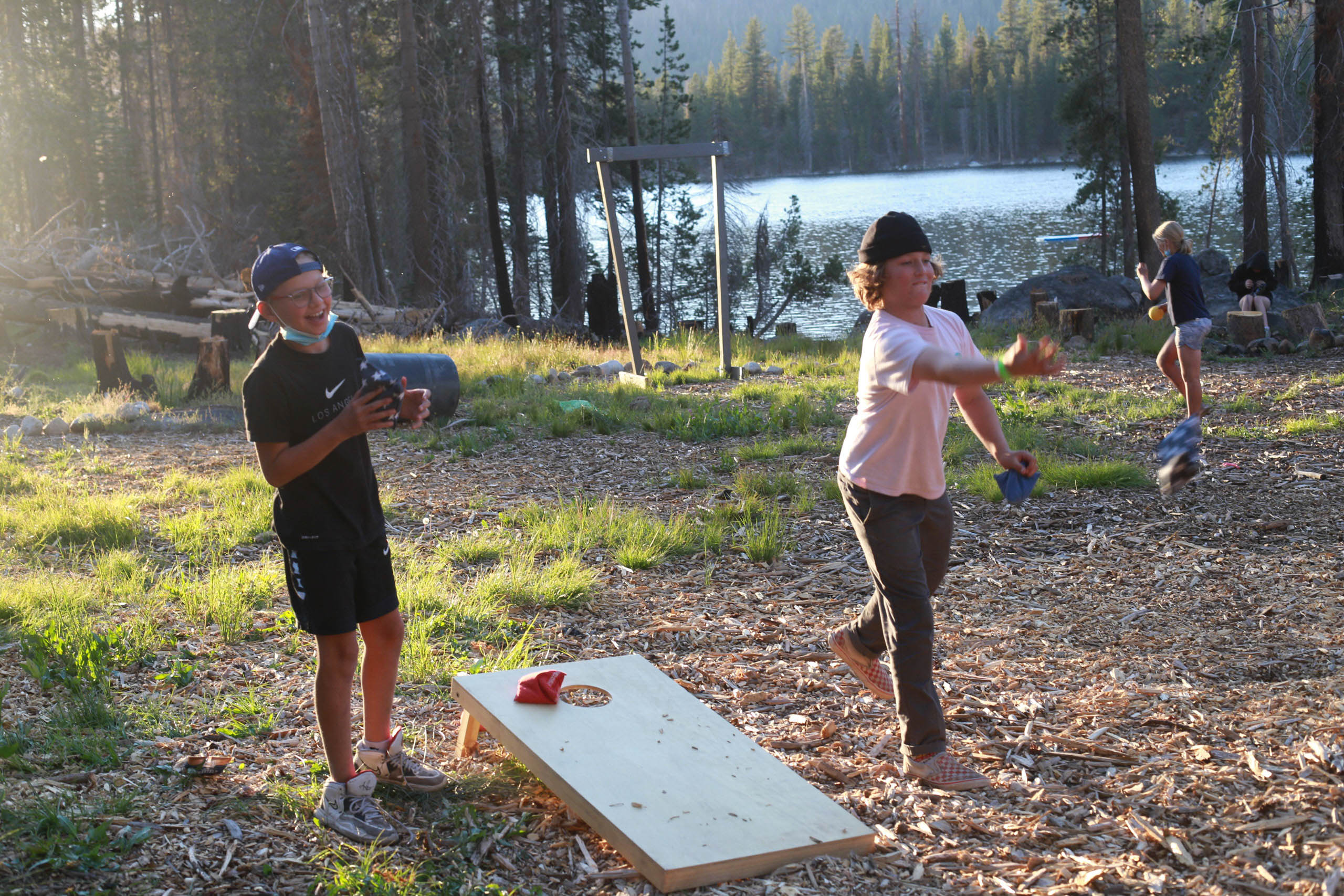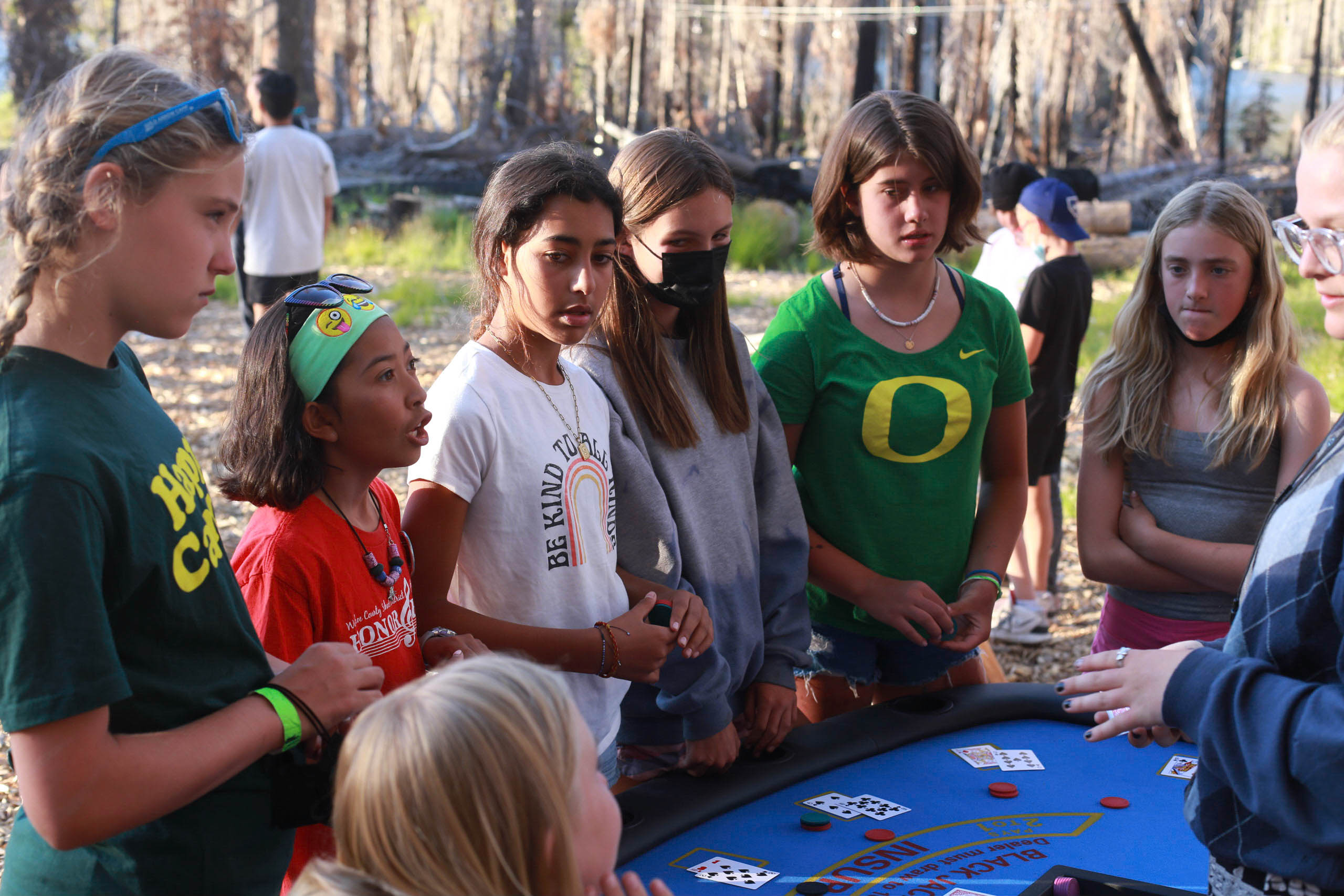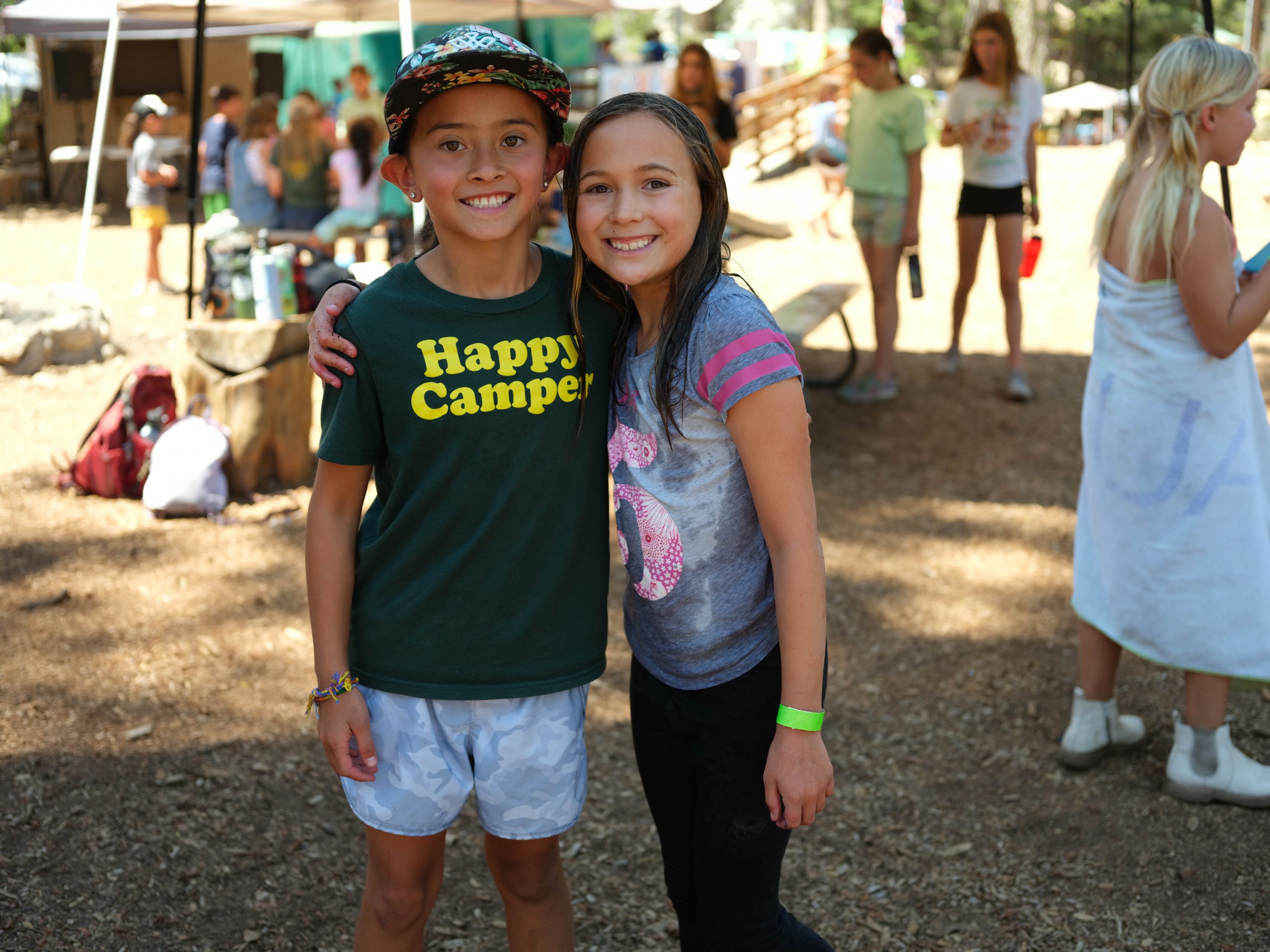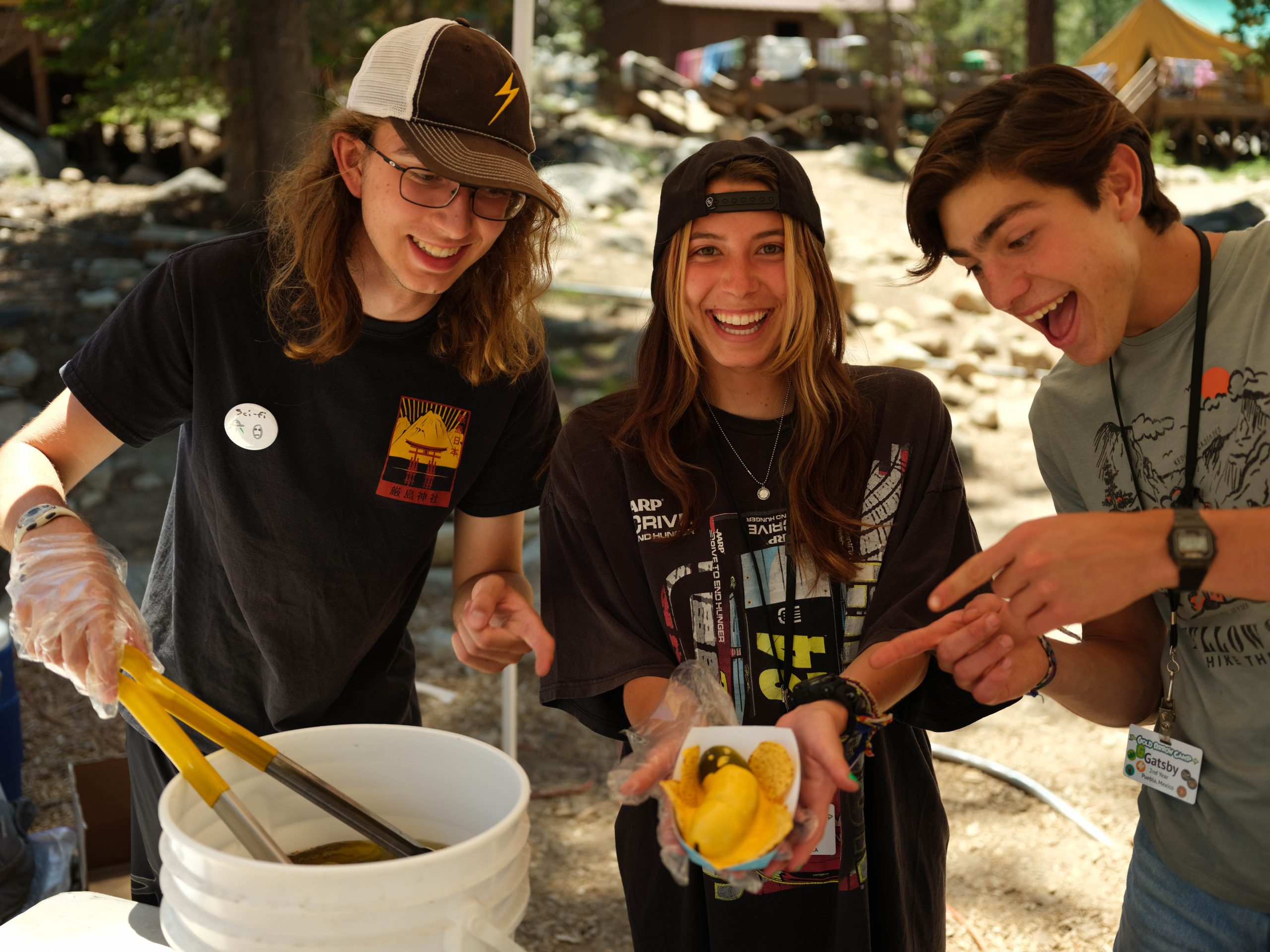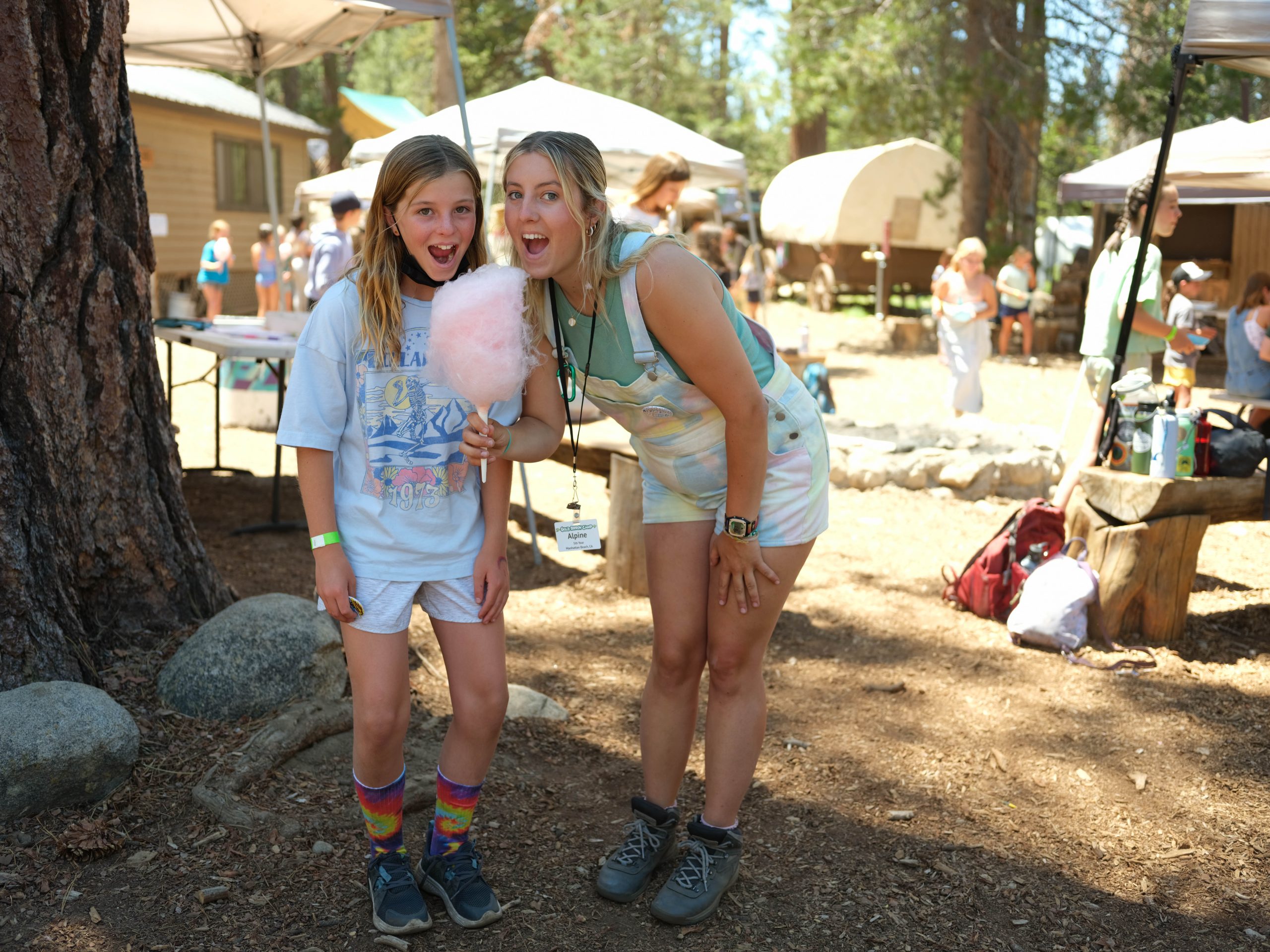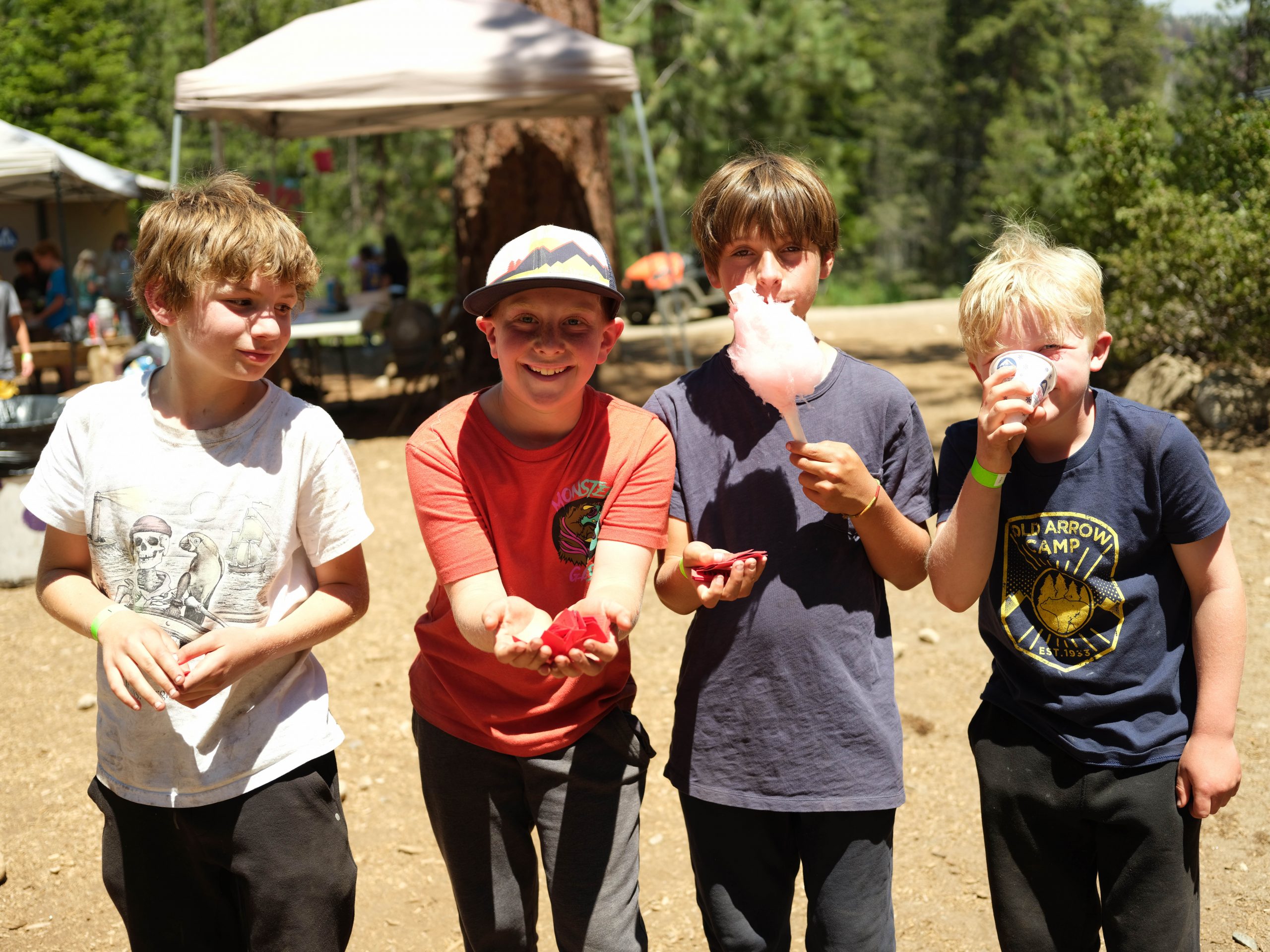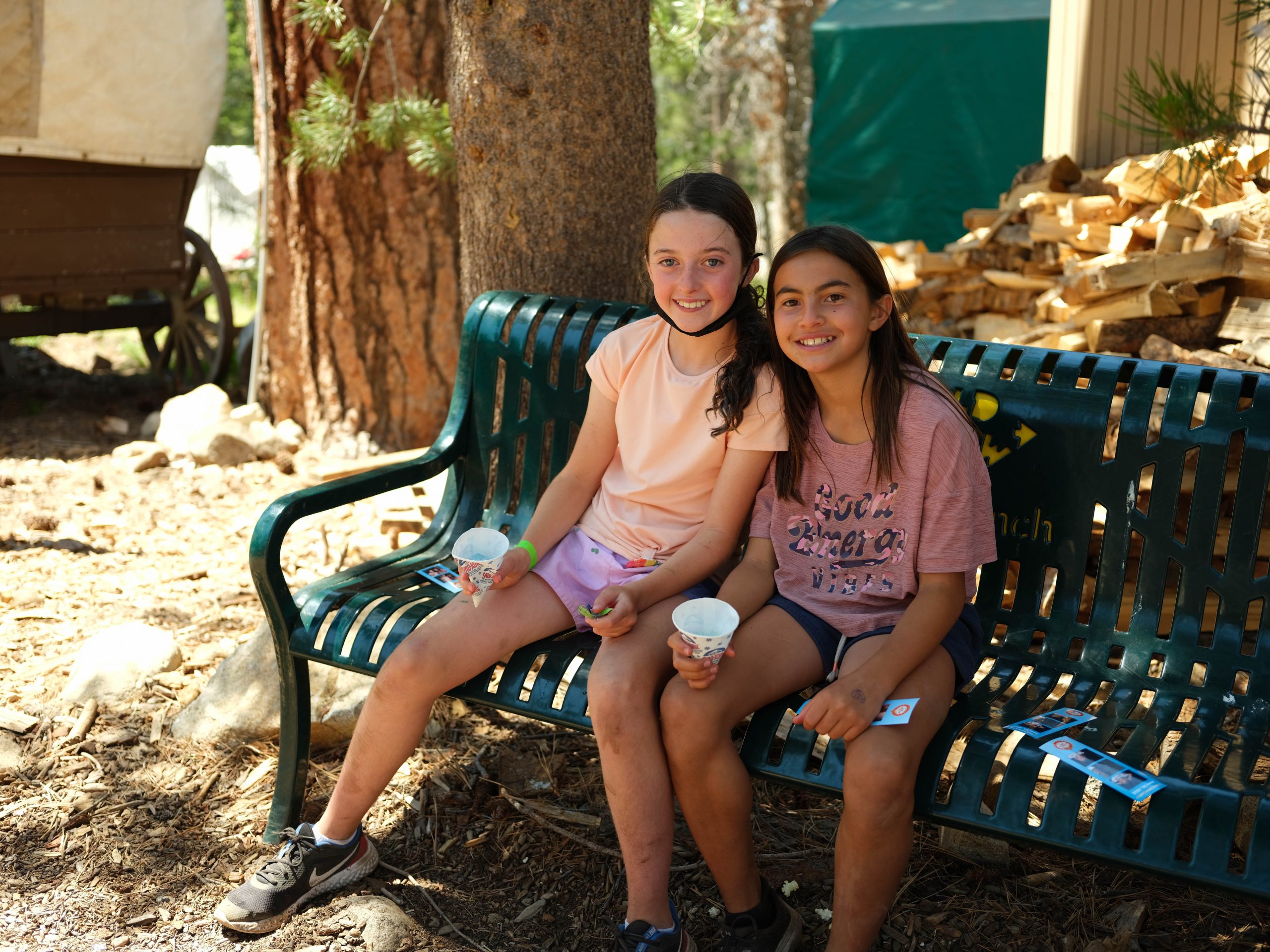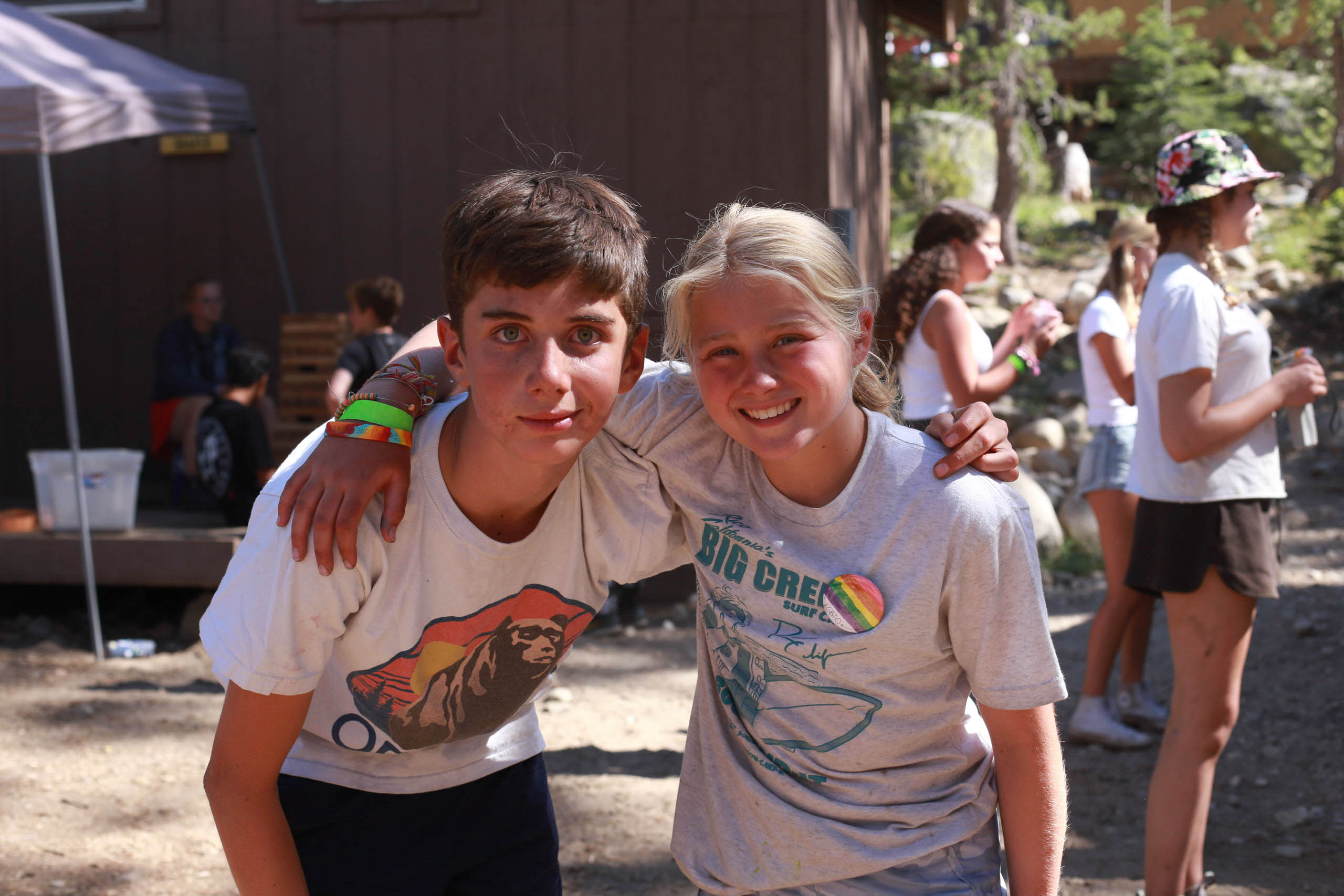Tigers’ Social – Session 2
Tigers are our campers heading into 5th and 6th grades. They’re at a great age for age group socializing and events, and they enthusiastically participated in yesterday’s Tigers’ Social, which included socializing, snacks, and a rousing game of Bingo!
Eagles’ Social – Session 1
Our Eagles campers enjoyed a fun social together this week. On Tuesday, they had a fun evening of casino games, laughter, and ice cream!
Lions’ Social – Session 1
Our Lions campers had a blast at their social on Sunday evening. They had a fun evening of games, laughter, and ice cream!
Carnival – Session 1
As always, Carnival was a blast for all campers and staff! Check out some highlights from the day here!
Bears’ Adventure – Session 1
A highlight of the two-week session for our youngest campers (grades K-3), and their version of backpacking, is Bears’ Adventure. This one-night trip allows campers to experience sleeping outdoors under the stars and cooking over a campfire. Campers’ luggage is taken for them to the campsite, so they are not technically “backpacking,” because they have no pack to carry. With just their water bottle and their positive attitude, they set out from camp singing and talking on their hike.
The best part of Bears’ Adventure is the free time kids get to play and explore the area. For many campers, the longer sticks provide the perfect start to a fort. Others enjoy laying on their sleeping bags talking with friends or silently watching clouds move overhead. Some participate in crafts and games while enjoying being outdoors. For many of these kids, Bears’ Adventure is their first experience “roughing it,” and they absolutely love it.
When they hike back into camp the morning after their adventure, our Bears campers stand a little taller. And their dirty, smiling faces are the best indication that they have experienced the awe of nature.
Why Kids Need to Get Uncomfortable
As parents, we spend a lot of time making our kids comfortable. Feeling cold? I’ll grab you a sweatshirt. Hungry? Let me get you a snack right away! Kid being unkind? I’ll complain to the teacher and make her stop!
At times, I’ve felt like it’s my duty to alleviate any discomfort my child is feeling. I think a lot of parents feel this way during this unique era of “overparenting.” One friend described the “lawnmower” parent who grooms the path for their child to make it smooth and without any bumps.
Some of us by nature are more “gritty” than others, able to push ourselves and deal with discomfort. Think about endurance runners who stumble across the finish line, bloody and exhausted. Others of us are more prone to climbing deeper into our turtle shell when faced with life’s inevitable discomforts and challenges. We tend to hunker safely inside our comfort zone and not let anyone or anything pull us out.
No matter where our kid’s (or our own) starting point may be, it’s important to explore the concept of being uncomfortable and, as parents, learn to tolerate that discomfort when our kids are feeling anxious, nervous, or afraid.
It’s not easy. Our natural instinct is to protect our kids from any and all discomfort. And when they’re little, that natural instinct serves us (and them) well. We change dirty diapers, feed them when they’re hungry, grab them before they run into the street.
Emotional discomfort is even harder to handle as a parent. When a kid makes a mean comment to our child and hurts his or her feelings, we bristle. We want to alleviate the discomfort immediately, so we call the school, the other kid’s parents, and the FBI to come in and stop that horrid child from making our beloved feel uncomfortable.
How can we best help our kids develop into adults who persevere and can handle life’s inevitable setbacks?
We must learn to coach our children to tolerate their discomfort. If we help them figure out coping strategies, they will be better able to respond the next time an uncomfortable or painful situation arises. For our kids to develop their grit and learn to expand their comfort zone, we need to be supportive, engaged, and empathetic, without immediately swooping in to ease their discomfort.
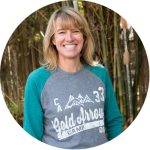
Audrey “Sunshine” Monke has been the owner of Gold Arrow Camp since 1989. She is the author of the 2019 parenting book, Happy Campers: 9 Summer Camp Secrets for Raising Kids Who Become Thriving Adults. “Sunshine” has been writing and podcasting about summer camp, well-being, social skills, and parenting at Sunshine Parenting since 2012.
More Resources
Coaching Kids to Better Friendships
“Friends are everything. They are always there if you have a problem or if you get hurt, they can always help you up.”
– Patricio, Camper, Age 8
The commonly accepted trajectory of do well in school -> get into a good college -> make a lot of money -> flourish in life is not exactly accurate. You only have to know one unhappy wealthy person to know that’s not the path that will lead to happiness or fulfillment.
What is a more accurate trajectory? good interpersonal (social) skills -> positive relationships -> flourish in life.
Michael Thompson’s statement, “Friendship is the gold of childhood,” stuck with me long after I attended his conference session on the social lives of children. Friendship is not just the gold of childhood, but also of life. In my research for my Master’s degree in Psychology, I looked closely at studies related to friendship, social skills, and well-being. What I found was not surprising. For children, and adults as well, positive relationships are the best predictor of overall happiness and well-being. As parents, teachers, and counselors, we should be putting a primary emphasis on helping kids develop the social skills they need to make and keep friends.
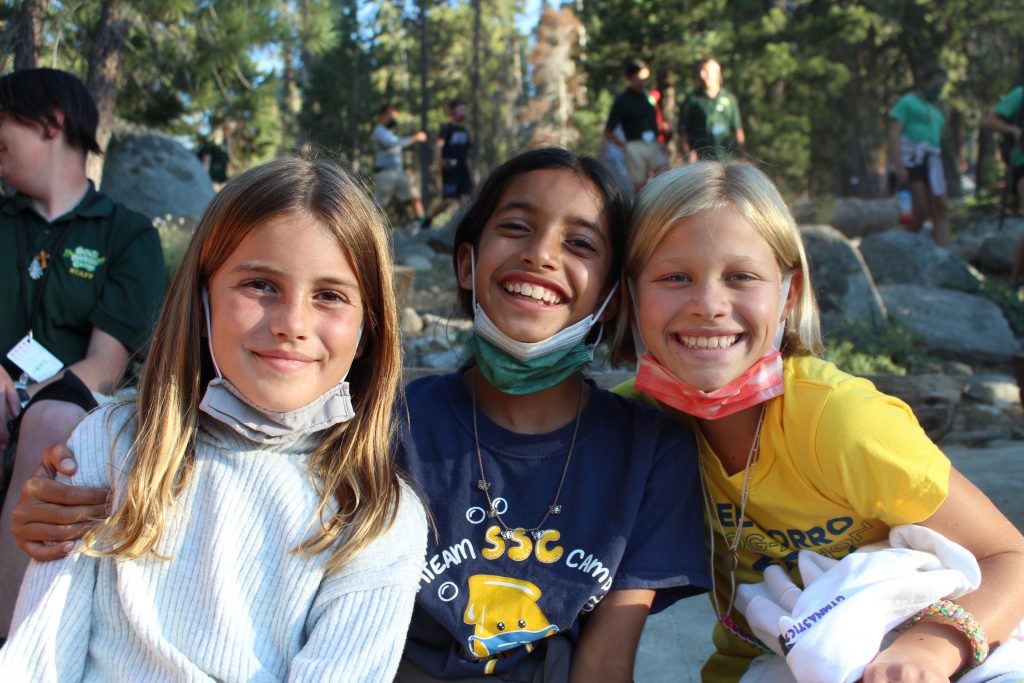
Unfortunately, our culture is not supporting the development of healthy, solid friendships between kids. Friendship is more important than any academic subject or athletic skill, and yet the way our kids spend their time does not reflect this importance. For many kids, there simply isn’t time in their lives for developing strong, close friendships.
What are our kids learning about friendship in this Instagram, Snapchat, and texting era of “friends?” Many boast hundreds, even thousands, of “friends” and “likes” on photos. Yet some of those same kids don’t have one single person in their lives that meets the criteria of a true and trusted friend. Face-to-face social skills, such as being able to read non-verbal cues, are learned through practice. If communication is primarily through media, then those skills are not being honed.
Another cultural factor that is counter-productive to the development of solid friendships is the constant, high-stakes competition our children are constantly in with their peers. Who’s ranked higher at school? Who made the “A” team? Who’s more popular? Often, instead of being truly supportive and encouraging of each other, kids want their peers to fail.
Making friends, and being a good friend, doesn’t come naturally to all people. And, coupled with the crazy culture we’re in, it’s no surprise that many kids are struggling to form strong friendships.
Friends are the reason campers and counselors return to Gold Arrow Camp year after year. “Make Friends” is one of the three main goals we chant at the opening of camp each session. At camp, there is time for friendship — precious, relaxing time to get to know each other, spend time making memories, and communicating face-to-face. Our whole camp community is built around inclusion, respect, and kindness. There is no competition at camp, no “A” team or “popular” group. Just kids having fun together and learning to live and play with each other, work out disagreements, and become better friends to each other.
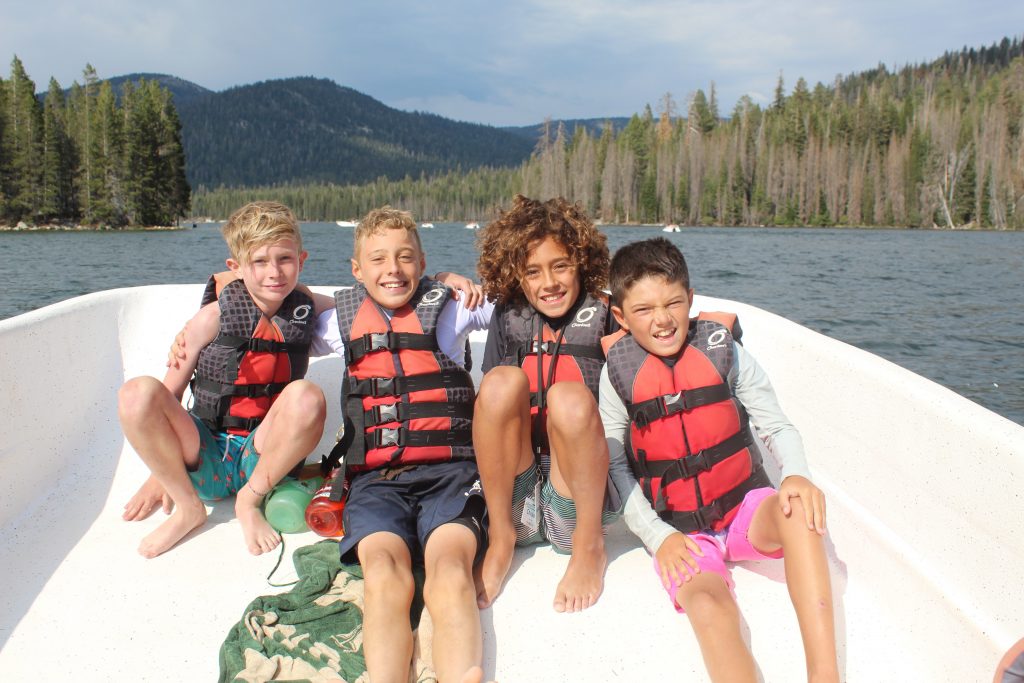
A few of the many friendship skills we focus on at GAC include:
Teaching Campers the Friendship Skill of Asking Questions
Friendship Tip: Find Your Best Calm Down Strategy
“A friend is someone you’re not afraid to be yourself with.”
– Hannah, Camper, Age 14
Counselors are trained to help kids connect from the moment they get on the bus until the last goodbye. Long talks at meals, around the campfire, and under the stars in sleeping bags are uninterrupted by cell phones and other technological distractions. Campers can’t “tune out” by putting earphones in. They stay engaged with each other and learn to connect. Counselors gently coach campers who need to develop social skills in areas such as listening skills, empathy, sharing, flexibility, initiating conversations, and understanding non-verbal cues. They encourage campers to be intentional about being good friends to each other and observant about what they appreciate about their friends.
“Friends are awesome, because they stand up for you, and they care for you.”
– Joey, Camper, Age 11
At one final campfire gathering last summer, the Randy Newman song, “You’ve Got a Friend in Me,” came on during the slide show. A group of four twelve-year-old boys sitting on the bench in front of me spontaneously put their arms around each other and started swaying back and forth, singing along to the song. I will never forget that vivid picture of the power of camp friendships.
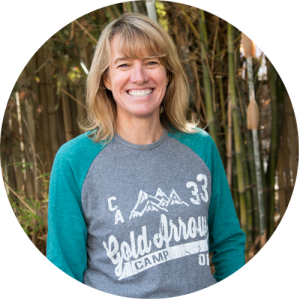
Audrey “Sunshine” Monke, MA, has been the owner of Gold Arrow Camp since 1989 and currently serves as the Chief Visionary Officer. In addition to her vision-casting and mentoring at GAC, Sunshine is an author (Happy Campers: 9 Summer Camp Secrets for Raising Kids Who Become Thriving Adults), podcast host, speaker and coach on the topics of parenting, social skills, and happiness. Find out more at her website, Sunshine Parenting.
Visit Sunshine Parenting for more friendship skills-related posts & podcast episodes.
Choose Kindness
We cannot tell the precise moment when a friendship is formed. As in filling a vessel drop by drop, there is at last a drop which makes it run over; so in a series of kindnesses there is at last one which makes the heart run over.
Dr. Samuel Johnson (1709-1784)
Summer, 2022 Theme: Choose Kindness
We selected Choose Kindness as our 2022 Summer Theme because growing our campers’ “kindness muscles” aligns with our mission of equipping campers to thrive despite life’s challenges. Focusing on kindness also helps us meet our goals of building our campers’ friendship skills (Make Friends) and growing their positive character traits (Grow). Learn more about our vision, mission, and goals on our Why GAC? page.
 Our kids are growing up in a challenging and divisive time. They are, unfortunately, witnessing a lot of disrespectful and mean behavior. In my book, I wrote about the importance of modeling and growing the trait of kindness in our kids. Here’s an excerpt from the kindness chapter:
Our kids are growing up in a challenging and divisive time. They are, unfortunately, witnessing a lot of disrespectful and mean behavior. In my book, I wrote about the importance of modeling and growing the trait of kindness in our kids. Here’s an excerpt from the kindness chapter:
The example and messages kids get from the media (and their school hallways) often do not promote kindness. Many kids learn that the quickest route to popularity is putting others down or leaving other kids out. In the perceived zero-sum social worlds of middle and high school, one person being put down means you get on a higher rung of the social ladder. Social media posts, political discourse, and cultural norms often promote name-calling and being mean, gossiping, and telling jokes at the expense of others. That’s what our kids are seeing and hearing every day, and that’s also why many kids start to consider it cool to perpetrate mean behaviors. It’s no wonder that while adults are sending hateful messages through tweets, our kids are practicing a similar level of meanness on their own media. Why are adults so shocked to hear about horrendous stories of cyber and in-person bullying when we as adults are modeling that very same behavior? But there is hope for our world, because kids intuitively understand the benefits of kindness and can be taught to be kinder when we take the time to model, talk about, and practice kindness with them.
Camp Secret #8: Make it Cool to Be Kind (Happy Campers: 9 Summer Camp Secrets for Raising Kids Who Become Thriving Adults)
This summer at GAC, we’re putting the spotlight on what it looks and feels like to choose kindness in our interactions with and response to others.
We’ll be growing our campers’ kindness muscles by:
- Talking about and practicing kindness habits like building each other up with positive words (WOWs!) and doing random “GACs of Kindness.”
- Practicing conflict resolution skills and learning how to respond (not react) with kindness and clear boundaries when others upset us with their behaviors or words.
- Focusing on how being kind helps us make friends and form friendships that are stronger and longer lasting.
- Doing projects and activities that involve giving to others.
- Reflecting on how it makes us feel to choose kindness and practice being kind to others. (Spoiler alert: We feel happier when we’re being kind!)
From the moment campers arrive, counselors will be modeling for and encouraging them to incorporate kindness into their daily words, actions, and routines. “GACs of Kindness” will be recognized and praised by counselors, announced at our daily Morning Assemblies, posted on our WOW board, and talked about throughout the session.
Helping others makes people happy. It feels good to share, to give, and to be kind to others. Sometimes in secret, and sometimes in front of others, we’ll be doing kind things for our fellow campers, counselors, support staff, and those outside our camp community this summer.
One of the great things about Gold Arrow Camp is that so many people feel happy when they’re here. We’re committed to equipping our campers with habits and skills that they can practice long after their session at camp.
This summer, we’re focusing on how – regardless of our circumstances and others’ behavior – we can always choose kindness.
Kindness Links/Resources
2022 Gold Arrow Camp Kindness Calendars
2022 Kindness Calendars
Check out GAC’s Kindness Calendars for the 2022 year! Click on each month for a printable version or click here to print all 12 months!
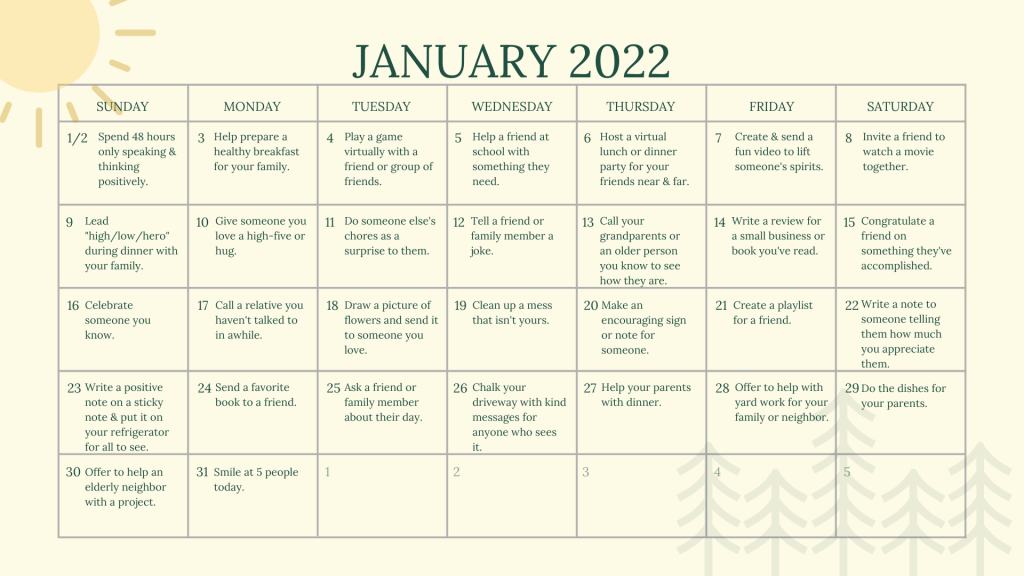
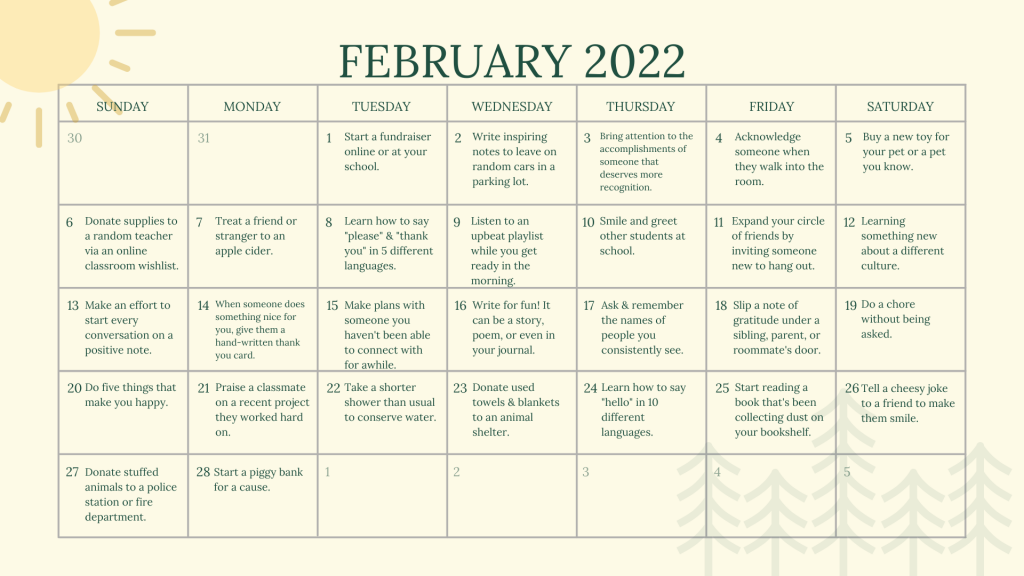
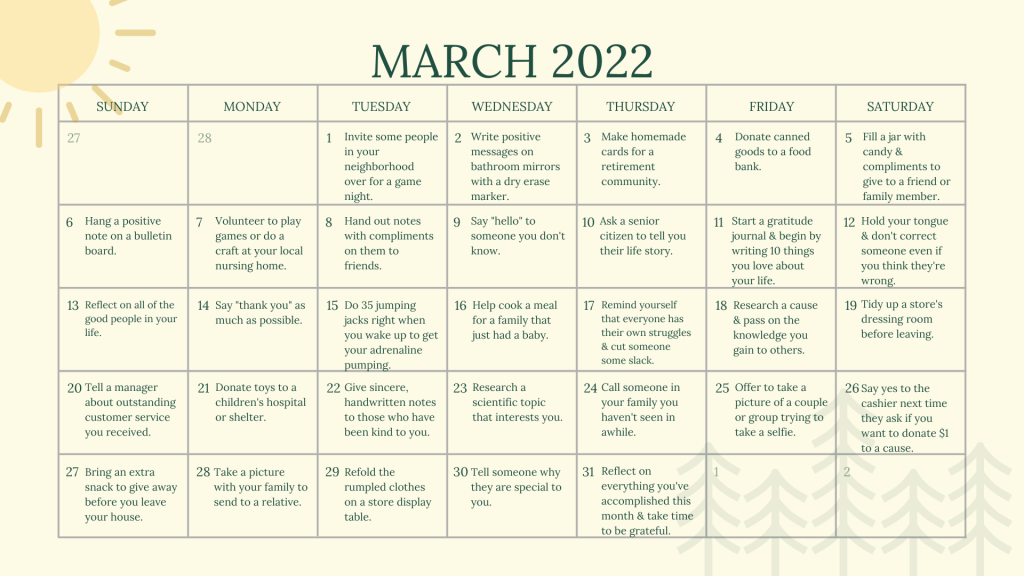
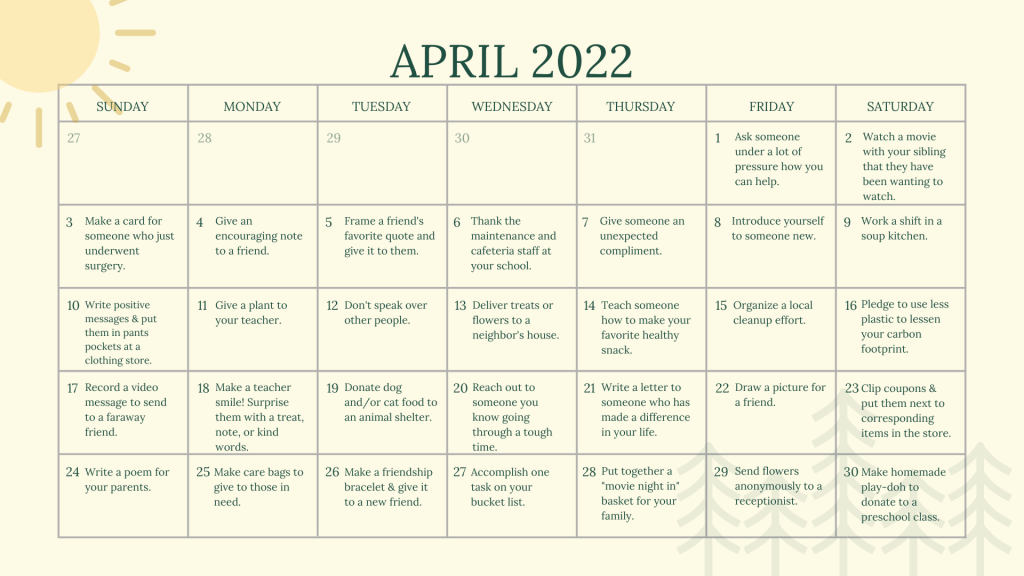
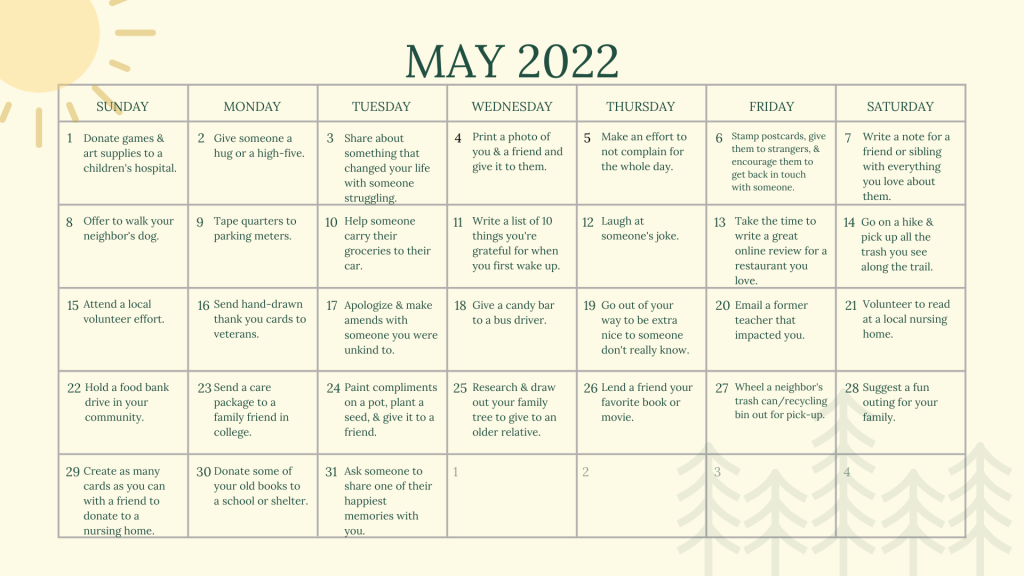
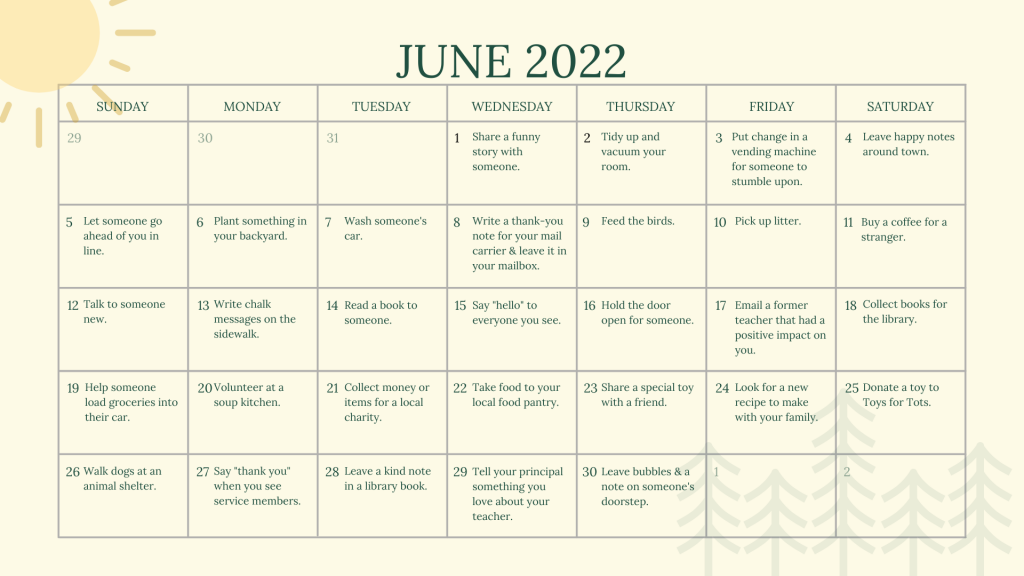
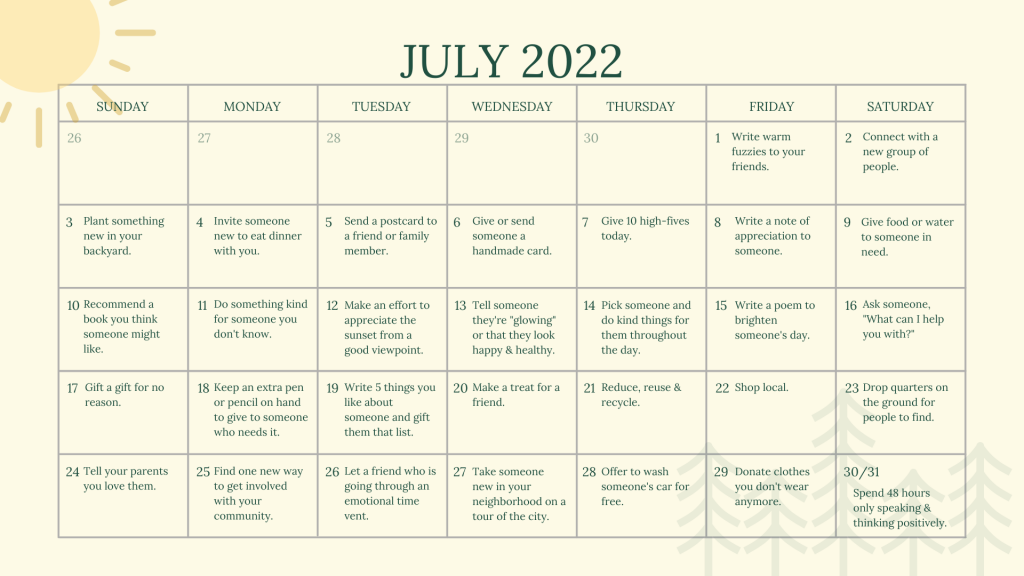
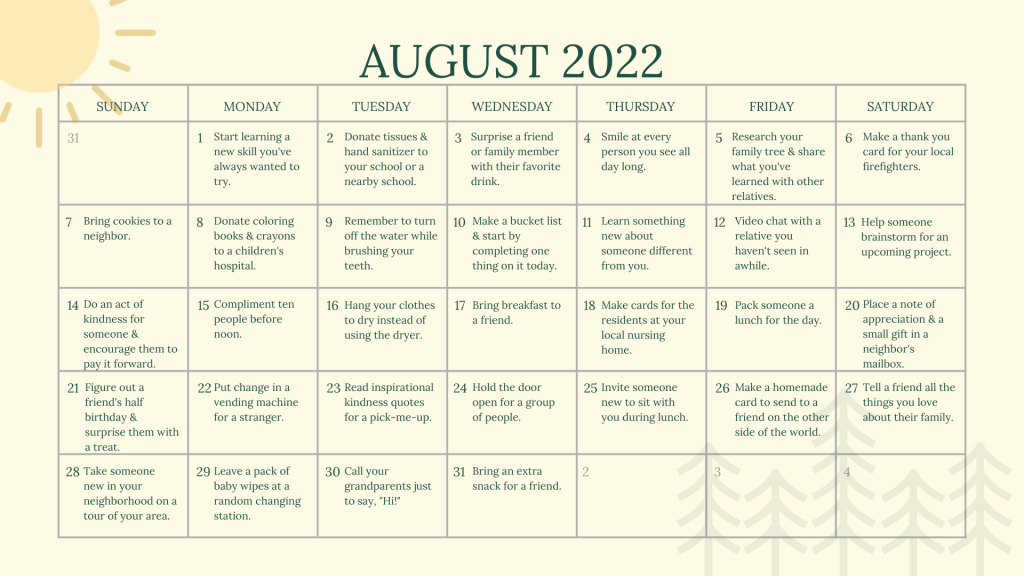
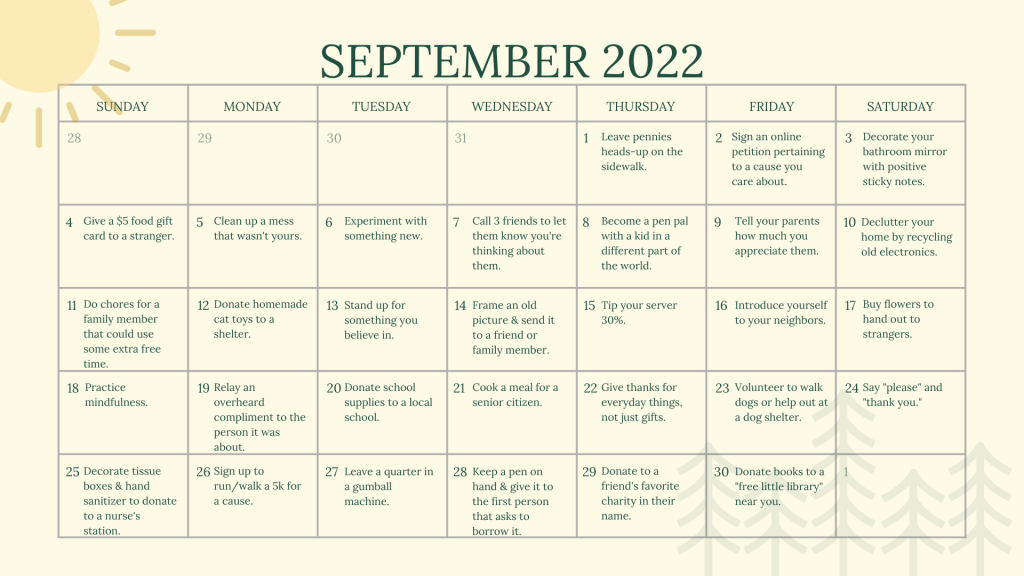
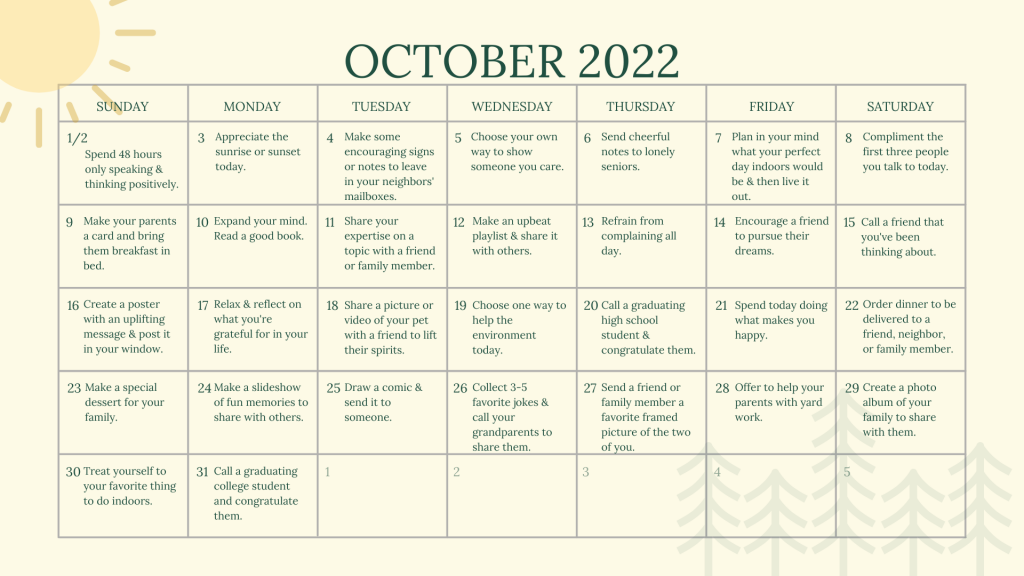
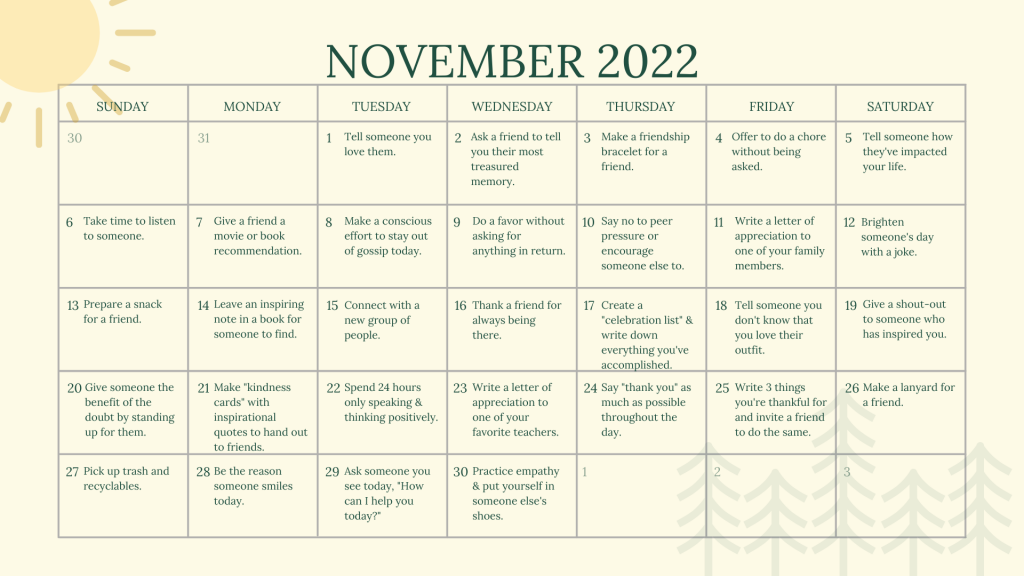
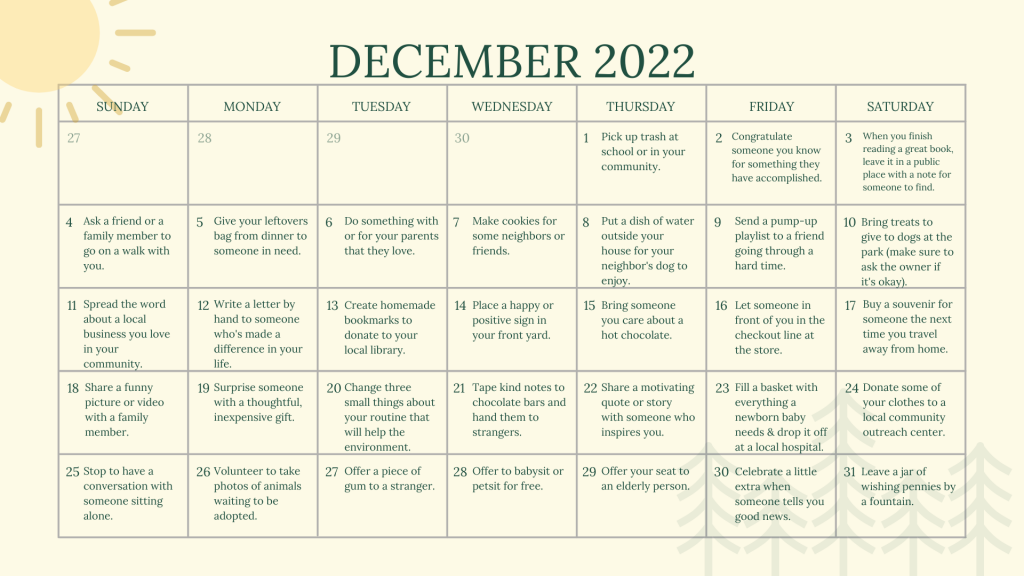
Five Reasons Every Teen Should Go To Summer Camp
By Audrey “Sunshine” Monke. Originally published at Sunshine Parenting
#1 Improve Interpersonal Skills & Form Close Friendships
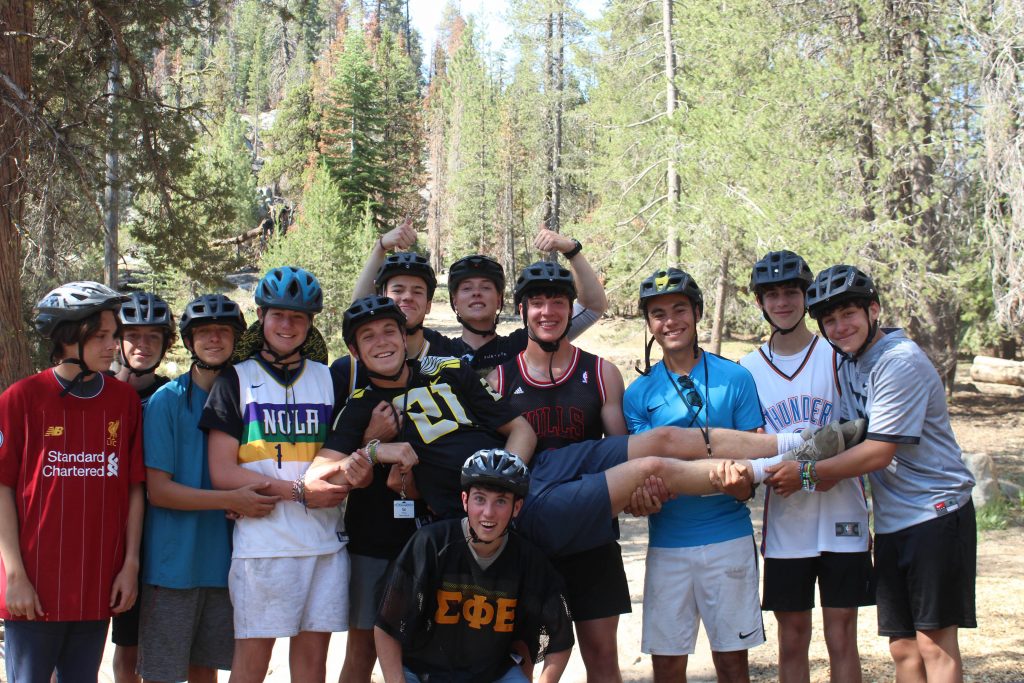
“In a … study of 515 senior executives, emotional intelligence was a better predictor of success than either relevant previous experience or high IQ.” -Forbes, “Look for Employees with High EQ over IQ”
In a world where anyone can look up a fact or equation and where machines are replacing even complex workplace tasks, employers need employees who can interact effectively with other people. This is one of the most important skills teens learn at camp. In the unplugged, non-competitive camp culture, teens build up their “emotional intelligence” (EQ), their face-to-face communication and relationship skills. 21st-century employers need people who can communicate, collaborate, and cooperate with others, and teens who come to camp get to practice those skills every day.
If you are debating whether your teen can miss a few weeks of SAT prep or a summer academic program, know that the 1600 SAT score will never outweigh the important communication and relationship skills he or she will develop at camp. Whether on a backpacking trip, cheering each other through a ropes course, or chatting around the campfire, the interpersonal skills teens build are the same ones they’ll need to be successful adults in families, communities, and companies.
#2 Take Safe Risks and Challenges
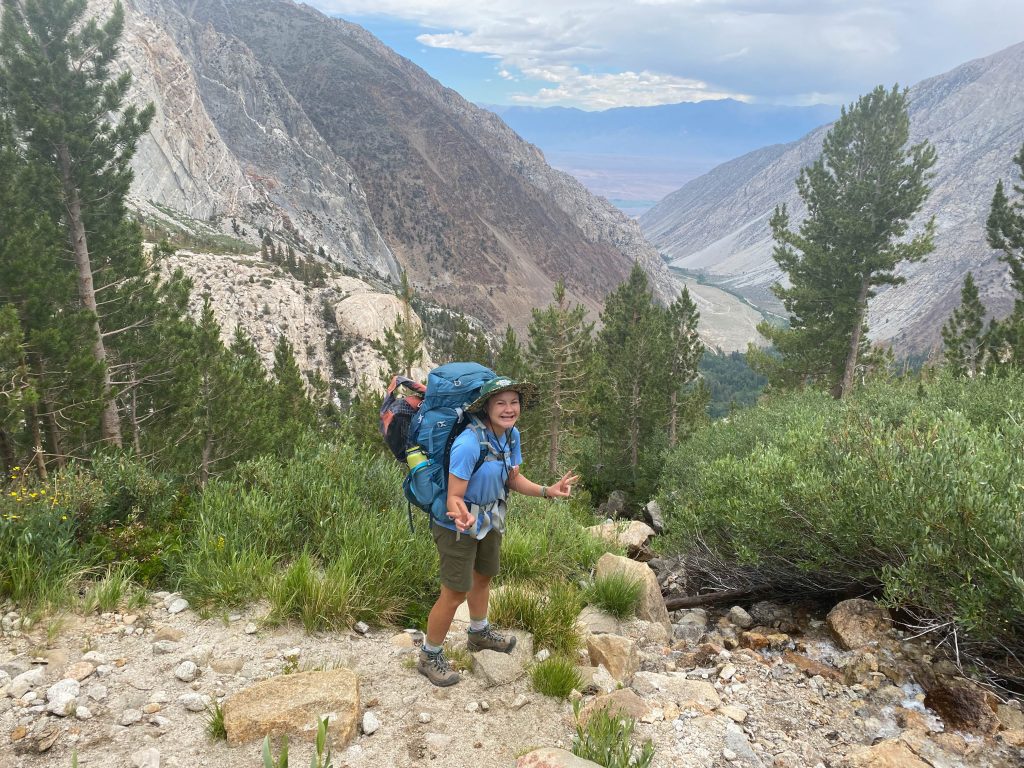
Teens thrive on risk. Thanks to recent findings (described in Age of Opportunity and Brainstorm) about the unique attributes of the teen brain, we now understand the reason for the “mortality bump” for 17-year-old boys. They do stupid, daring things not because they aren’t aware of the dangers, but because—to them—the reward of leaping from a rocky cliff or speeding along a curvy mountain road seems to outweigh the risk.
A teen at camp has the opportunity to take many safe, controlled risks. Climbing to new heights on a rock wall or ropes course, jumping the wake of a boat on a wake board, or reaching the peak of a 10,000-foot summit are all healthy risks teens take at camp. Plus, being in a controlled camp environment frees teens from exposure to health risks like alcohol and drug use.
#3 Experience Character Growth and Develop Life Skills
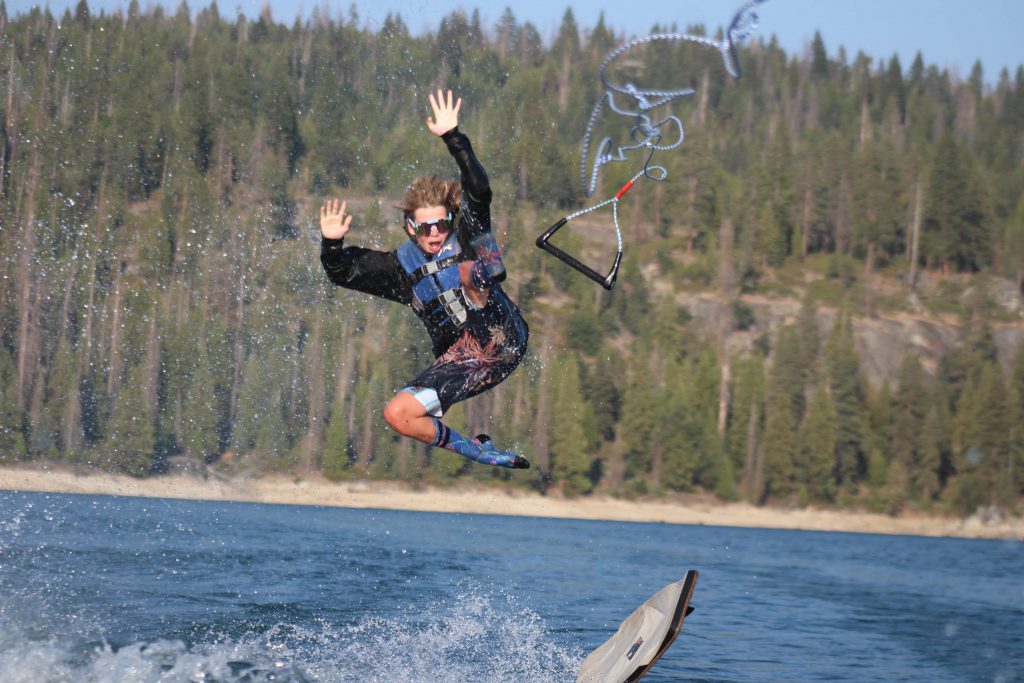
“A profound gap exists between the knowledge and skills most students learn in school and the knowledge and skills they need for success in their communities and workplaces.” –Partnership for 21st Century Skills
Schools aren’t doing a very good job teaching kids grit, perseverance, and leadership. But that’s not their job. Rather, schools are VERY busy teaching the core curriculum and assessing how well our kids know it. No school has time to see how “gritty” a kid is, but at camp, the “grit-meter” is always running, and it’s personal character—not a report card or an athletic achievement—that rises to the top.
Teens also develop other important life skills at camp, including independence, responsibility, and decision-making. Teens grow considerably in an environment away from their parents where they are forced to live on their own and find their own resources.
#4 Meet Positive Role Models
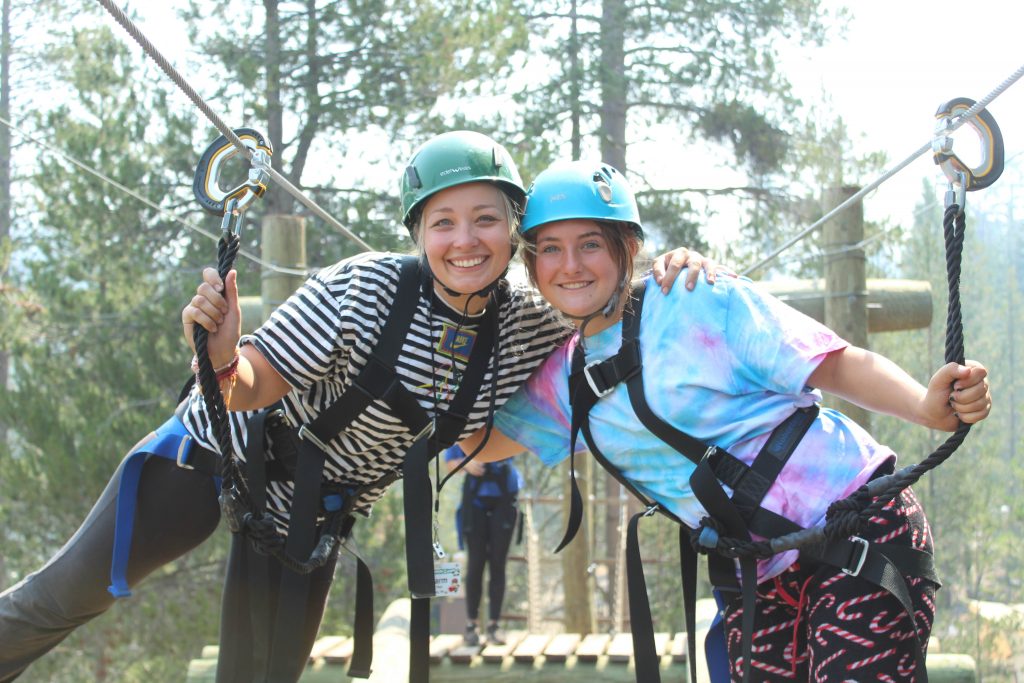
Watch or listen to a popular music video, reality TV show, or sports event, and you’ll be hard-pressed to find positive young adults teens can emulate. But walk into any well-run summer camp and you’ll be surrounded by wholesome, outdoorsy young people who like being around others and doing fun activities. Camp offers teens the opportunity to be among young adults who are positive role models and to form close relationships with them. Most camp counselors are hard-working college students who want to serve others. They are friendly, personable, and are just the kind of young adults you want your teen to become.
#5 Discover Their Best Self
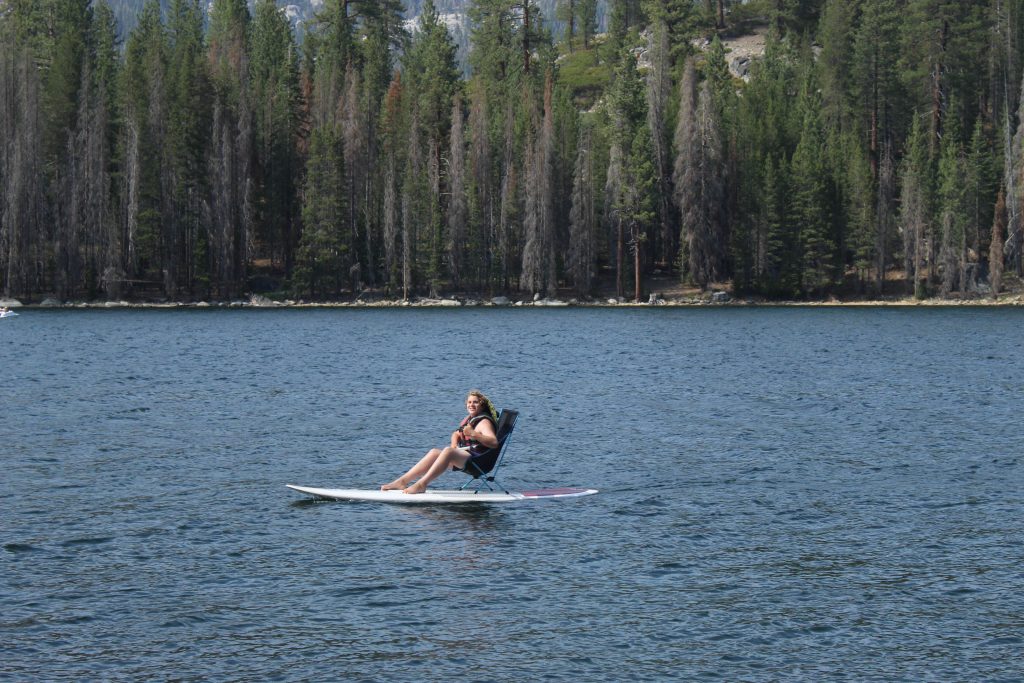
We live in a world where teens—often by their own parents—are steered towards success via the SAT, the college admissions grind, a “good” major, and a high-salary job. Look around at many adults, however, and see where that path got them. Despite knowing better, we still expose our kids to the same gauntlet.
Perhaps college education is the best option for most young people, but I’ve met many who are halfway done (or all the way done) and still don’t know who they are or what they are passionate about. Camp experiences offer teens the chance to step back from the treadmill of academics, competitive sports, and their sleep-deprived, over-scheduled existence, and instead think about what’s important to them. Many campers become less self-absorbed after spending a few weeks at camp, learning to train their focus on others. They also discover new hobbies and avenues to pursue in education and their future careers.
Each summer, tens of thousands of teens leave their phones and car keys at home and head to summer camp as campers, counselors in training, or counselors. Many teens who have never been to camp cannot relate to how a teenager could make such crazy personal sacrifices. And yet, teens are the age group that fills most quickly at many camps. Because, perhaps more than any other time during youth, camp offers the respite, recreation, and renewal to help teens thrive. Teens who have already been to camp know this and want to come back, year after year.

Gold Arrow Camp offers a Junior Counselor Program for returning GAC campers and an Outdoor Leadership Course for teens (grades 9th-11th).
Originally published at Sunshine Parenting.

Audrey “Sunshine” Monke, MA, has been the owner of Gold Arrow Camp since 1989 and currently serves as the Chief Visionary Officer. In addition to her vision-casting and mentoring at GAC, Sunshine is an author (Happy Campers: 9 Summer Camp Secrets for Raising Kids Who Become Thriving Adults), podcast host, speaker and coach on the topics of parenting, social skills, and happiness. Find out more at her website, Sunshine Parenting.

